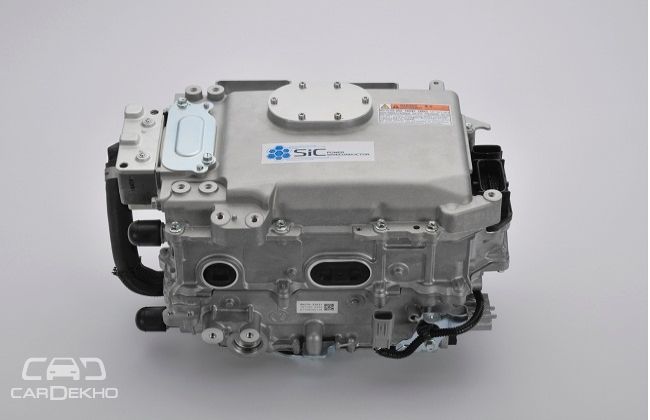Toyota to test SiC Power Semiconductor on the road
Published On Jan 30, 2015 10:39 AM By Abhijeet
- 757 Views
- Write a comment
Continuing its impeccable technology development for the future, Toyota Motor Corporation will soon be driving the silicon carbide (SiC) power semiconductor technology to the roads of Japan this year. These real world tests would evaluate the performance of the SiC power semiconductors leading to provide significant efficiency improvements in hybrid power train and other vehicles running on electric power. Power semiconductors are found in power control units (PCUs), which are used to control motor drive power in hybrids and other vehicles with electric power trains. These PCUs critically mould the use of electricity by supplying battery power to the motors during operation and recharging the battery using energy recovered during deceleration.

Starting with the Camry hybrid prototype, Toyota is installing SiC power semiconductors (transistors and diodes) in the PCU's internal voltage step-up converter and the inverter that controls the motor. Data gathered will include PCU voltage and current as well as driving speeds, driving patterns, and conditions such as outside temperature. By comparing this information with data from silicon semiconductors currently in use, Toyota will assess the improvement to efficiency achieved by the new SiC power semiconductors. Road testing of the Camry prototype will begin (primarily in Toyota City) in early February 2015, and will continue for about one year.
Currently, power semiconductors account for about 20 per cent of a car's total electrical losses. This means raising the efficiency of the power semiconductors is a promising way to increase engines efficiency. By comparison with existing silicon power semiconductors, the newly developed high quality silicon carbide (SiC) power semiconductors create less resistance when electricity flows through them.
Continuing its impeccable technology development for the future, Toyota Motor Corporation will soon be driving the silicon carbide (SiC) power semiconductor technology to the roads of Japan this year. These real world tests would evaluate the performance of the SiC power semiconductors leading to provide significant efficiency improvements in hybrid power train and other vehicles running on electric power. Power semiconductors are found in power control units (PCUs), which are used to control motor drive power in hybrids and other vehicles with electric power trains. These PCUs critically mould the use of electricity by supplying battery power to the motors during operation and recharging the battery using energy recovered during deceleration.

Starting with the Camry hybrid prototype, Toyota is installing SiC power semiconductors (transistors and diodes) in the PCU's internal voltage step-up converter and the inverter that controls the motor. Data gathered will include PCU voltage and current as well as driving speeds, driving patterns, and conditions such as outside temperature. By comparing this information with data from silicon semiconductors currently in use, Toyota will assess the improvement to efficiency achieved by the new SiC power semiconductors. Road testing of the Camry prototype will begin (primarily in Toyota City) in early February 2015, and will continue for about one year.
Currently, power semiconductors account for about 20 per cent of a car's total electrical losses. This means raising the efficiency of the power semiconductors is a promising way to increase engines efficiency. By comparison with existing silicon power semiconductors, the newly developed high quality silicon carbide (SiC) power semiconductors create less resistance when electricity flows through them.













